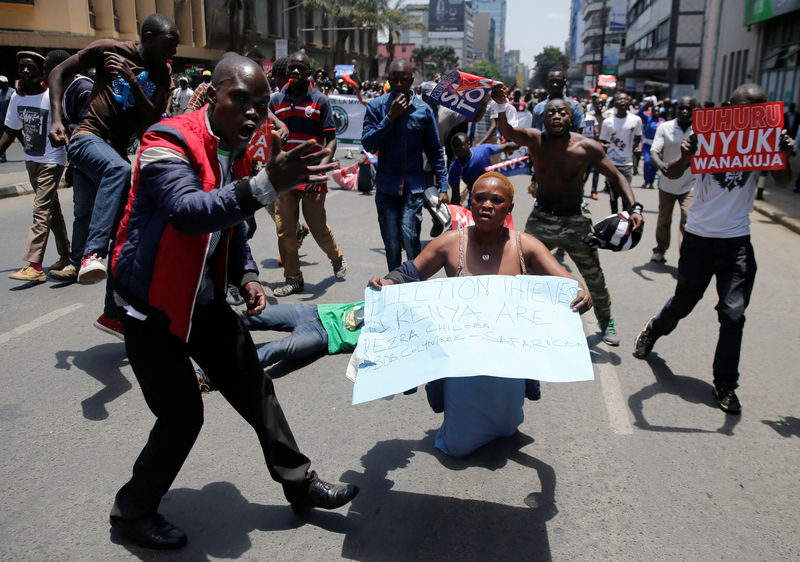By George Obulutsa
NAIROBI (Reuters) - Kenyan police fired teargas and shots in the air on Monday as hundreds of demonstrators marched through the capital to protest proposed legal changes that would make it harder for the Supreme Court to annul an election.
The country is due on Oct. 26 to repeat a presidential election after the Supreme Court nullified an Aug. 8 vote due to procedural irregularities. President Uhuru Kenyatta, who won the August election, will face opposition leader Raila Odinga.
At least 37 people were killed in a police crackdown on protests immediately after the August vote, the government-backed Kenya National Commission on Human Rights said in a report on Monday. It is the highest death toll yet given for the violence.
Uncertainty over the coming election has created turmoil in the East African nation, which is a regional trade hub and staunch Western ally.
Odinga's opposition alliance is threatening to boycott the October vote unless the electoral board changes some personnel.
The protesters also want to warn ruling party lawmakers not to pass an amendment to the election law that would limit the circumstances in which the Supreme Court could void an election on procedural grounds, opposition lawmaker James Orengo said.
"If parliament passes the law tomorrow, it will be like declaring war on the Kenyan people," he said.
Justin Muturi, speaker of the National Assembly, said the amendment could be debated when parliament reconvenes on Tuesday if lawmakers were keen to push it forward.
He said the key part of the proposed law stipulates that if a candidate boycotts an election whose date has already been set, the remaining candidate would win the contest without formal polls being held.
The government was keen to avoid a constitutional crisis if Odinga pulled out at the last minute, frustrating the court's order to hold elections within 60 days, he said.
"We are trying to prevent a crisis should there be no elections," he told Reuters by phone.
As the demonstrators marched towards the election board, a Reuters journalist saw men in plain clothes near security forces fire shots in the air. Police on horseback set up blockades to prevent protesters from accessing some roads.
Later, police used teargas to disperse protesters in both Nairobi and the western city of Kisumu, Odinga's stronghold, Reuters witnesses said. A protest in the coastal city of Mombasa was peaceful.

The human rights report said some deaths were "attributed to police using live bullets and a few from police bludgeoning using clubs," the report said. It named a 6-month-old baby girl, a 7-year-old boy, and an 8-year-old girl as victims.
(Addtional reporting by Katharine Houreld, John Ndiso and Baz Ratner in Nairobi and Joseph Akwiri in Mombasa; Writing by Katharine Houreld; Editing by Matthew Mpoke Bigg)